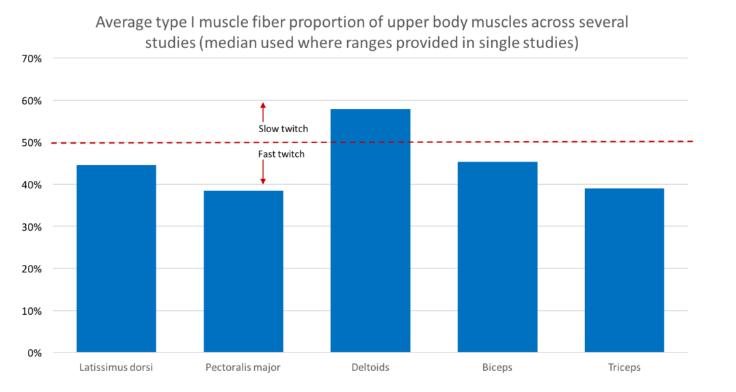
Estimate muscle fiber makeup and adjust
This would definitely be a finishing touches type addition to the app but would be interesting. Since the app tracks performance and reps so closely it might be able to notice if a lifter progresses better with higher or lower reps and start smart adjusting to the lifter’s personal physiology. While this would probably not offer a huge advantage over random rep undulation it would be something I haven’t seen before.
Answer

Another suggestion is to have the app adjust rep ranges for muscle groups depending on the type of muscle fibres in majority. For instance the picture below (which I'm not sure if it's real or not, but it shows my point)


Hi Tomislav,
Greg Nuckols makes a good case that this theory is unfounded here: https://www.strongerbyscience.com/muscle-fiber-type/.
To recap:
- Most muscles in your body have a fairly even split of fast-twitch and slow-twitch muscle fibers; very few muscles are (on average) incredibly fast-twitch or slow-twitch dominant.
- There’s not a practical test to know whether a particular muscle is composed primarily of fast-twitch or slow-twitch fibers. The methods you’d typically use in a gym setting (seeing how many reps you’d get with a particular percentage of your 1rm) have virtually no predictive power.
- The idea that you should train muscles differently based on their predominant muscle fiber type comes from the notion that fast-twitch muscle fibers respond best to heavy weights and low reps, and that slow-twitch muscle fibers respond best to light weights and high reps. Evidence is still very mixed on this point – it’s not yet clear that particular training styles specifically target fast-twitch or slow-twitch fibers in the first place.
- Even if there was good evidence for fiber type specific hypertrophy, and even if there was a good, practical test to know a muscle’s fiber type breakdown, it still wouldn’t change the general recommendation to keep training that muscle with a variety of rep ranges.
With that said, it may still be possible to find out if a lifter progresses better with high or low reps and to adjust to the lifter’s personal physiology, as Barrett suggested. But I'd be really surprised if that had to do with fibre type.

yes Greg is a very smart guy and I believe him on that point. Not sure physiology was the best word to use in my post but wasn’t sure what to say because preference didn’t seem quite right as I think there is more to it than that as well. Like I mentioned I’m not sure there would be much if any benefit over undulating reps as it is done now but if nothing else could make for an interesting data analysis
Customer support service by UserEcho

Hi Tomislav,
Greg Nuckols makes a good case that this theory is unfounded here: https://www.strongerbyscience.com/muscle-fiber-type/.
To recap:
With that said, it may still be possible to find out if a lifter progresses better with high or low reps and to adjust to the lifter’s personal physiology, as Barrett suggested. But I'd be really surprised if that had to do with fibre type.